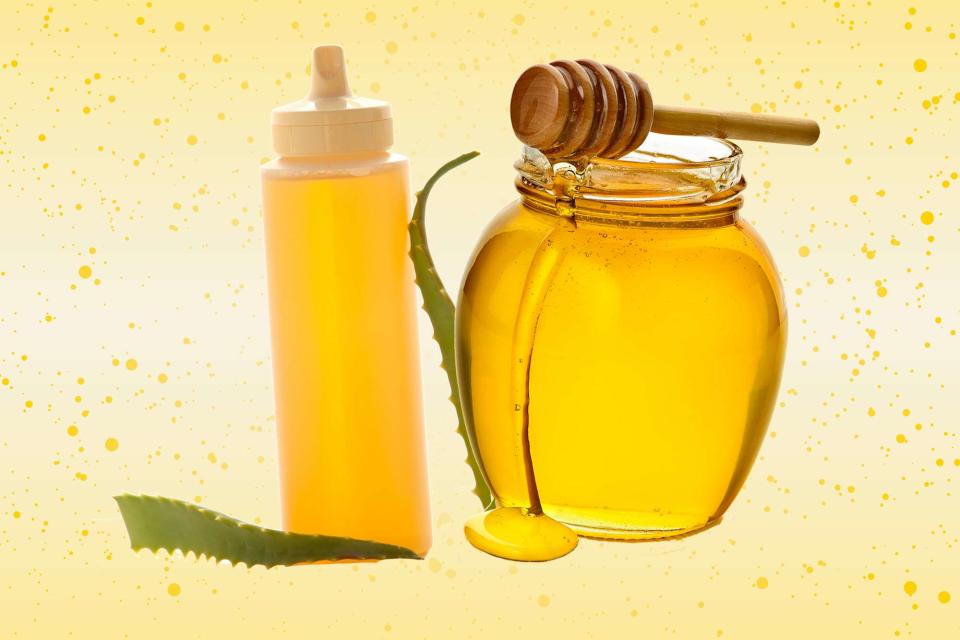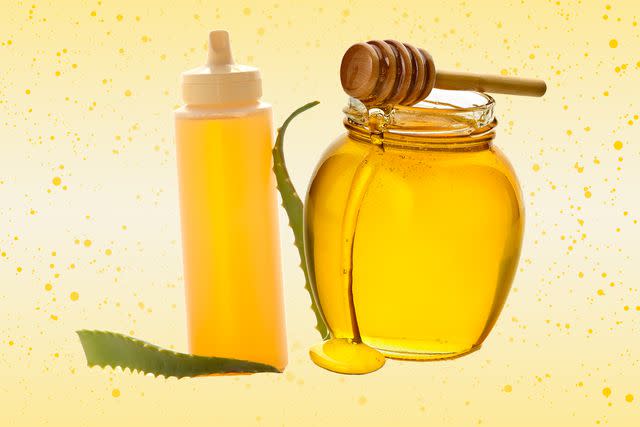Honey vs. Agave: What's the Difference?
Both of these ingredients are liquid sweeteners, so can you use one for the other? Read on to learn more.

Reviewed by Dietitian Emily Lachtrupp, M.S., RD
Picture this: You're in the middle of making dinner, maybe something like these Skillet Balsamic Chicken Thighs or these Barbecue Shredded Pork Wraps and the recipe calls for honey. But … you have none. You've rummaged through the pantry and, despite your meticulous meal planning this week, you seem to have overlooked the fact that you recently finished your last jar of honey and forgot to add it to your grocery list. Yet what you do have is a bottle of agave syrup ready to go, and you're up for a little improvising. But will that swap work? Is there a big difference between agave and honey, especially when you cook with it?
Here, we dive into the details of the differences between agave and honey, from taste profile to health benefits and, yes, even if they work as a swap in your weeknight dinner.

What Is Agave?
Agave comes from a plant native to semiarid regions of the Americas (dry but still with some rain), especially Mexico and the Caribbean. There are 200 different types of this plant, and it is also known for producing mezcal liquors such as tequila, which is made from blue agave.
Agave syrup comes from the heart of the plant where the sap is located. To produce it, the harvester removes the leaves and the roots to retrieve the sap, which is then finely filtered, heated and packaged for sale. Agave syrup is usually found in a bottle and has a sweet caramel-like flavor; the intensity depends on how light or dark the agave syrup is.
What Is Honey?
Instead of coming directly from a plant, honey is a product made by honeybees via a process in which they collect nectar from flowers and transport it in their honey sacs to their honeycomb. Beekeepers remove honeycomb frames from commercial hives and scrape off the wax cap that the bees created to protect the honey, then place it in an extractor where the honey is forced out of the comb.
Generally, honey tastes floral and earthy. However, there are more than 300 different varieties of honey, all with different colors, flavors and aromas. Because honey is produced from an animal, it technically isn't vegan.
Is Agave Healthier Than Honey?
If agave comes from a plant, does that make it healthier than honey? With so many plant-based products dominating the grocery shelves right now, it may seem like anything that comes from plants would automatically be healthier. But in terms of agave versus honey, this isn't exactly the case. Both agave and honey are sweeteners, and they should still be treated as a source of added sugar in one's diet.
"Both agave and honey provide natural sweetness, but both provide additional calories to dishes, as well as added sugar," says Lauren Manaker M.S., RDN, LD, CLEC. "It is important to remember that the nutrients found in both sweeteners are quite small in quantity, assuming people are sticking to proper portion sizes. Because of this, we should not lean on either of these foods as a major source of micronutrients."
The Health Benefits of Agave
According to the USDA Food Database, 1 tablespoon of agave contains 64 calories, 16 grams of carbs and 14 grams of sugar. Agave is made up of two types of sugar: about 80% of which is fructose and 20% glucose.
Because it has a high amount of fructose, per the International Journal of Environmental Research and Public Health, agave has a low glycemic index number of 17. (This is much lower than table sugar, which has a glycemic index of 68.) This means agave won't cause rapid blood sugar spikes and dips like other types of sugar.
With such a positive benefit on the body's blood sugar levels, agave syrup tends to be a go-to for people with diabetes looking to sweeten their foods without the huge spike. One 2014 animal study published in the Journal of Medicinal Food even found agave nectar to have a positive effect on weight management and glucose control.
"Agave nectar does contain trace amounts of specific vitamins like vitamins C and B, as well as minerals, including potassium, calcium and selenium, making it a bit more nutritious than table sugar," says Manaker. "Agave also contains phytonutrients (plant compounds) that may have an antioxidant benefit."
The Health Benefits of Honey
Per the USDA database, 1 tablespoon of honey contains 64 calories; it is slightly higher in carbs and sugar than agave, with 17 grams of carbs and 16 grams of sugar. Honey also sits in the middle of the glycemic index at 58, which is significantly higher than agave nectar.
On the other hand, studies, including one published in Pharmacognosy Research, found honey to be beneficial for other areas of health including gastrointestinal, neurological and cardiovascular diseases. Honey also has antioxidant properties, meaning it could help with reducing inflammation in the body.
"Honey has benefits that have gone largely unknown," says Manaker. "It's a wholesome sore-throat soother, a natural energy booster and more. Research has shown that honey contains many vitamins, minerals, amino acids and antioxidants. Flavonoids and phenolic acids, which act as antioxidants, are found in honey."
Nevertheless, it's still important to note that honey—as well as agave—is still a source of added sugar, even if it proves to have a number of health benefits.
Is Agave a Good Substitute for Honey?
"Agave can work as a good substitute for honey, depending on the recipe," says Emilie Berner, lead chef of Online Plant-Based Culinary Arts & Food Operations at the Institute of Culinary Education. For example, if honey is simply being used as a sweetener and the taste doesn't matter as much, Berner says it's OK to switch them out. On the other hand, if a recipe is specifically relying on the flavor of honey for the dish, it isn't exactly interchangeable with agave. For example, you could swap agave for honey when making an Avocado & Banana Smoothie, but Honey-Glazed Roasted Delicata Squash wouldn't be the same without that distinct honey flavor.
Can You Substitute Agave and Honey for Sugar?
"Agave and honey are wonderful to cook with. Just keep in mind that their textures are very different from regular sugars, so they can't necessarily be swapped cup for cup," says Berner.
So if you are switching out your usual sugar with agave and honey, use 2/3 cup of the liquid sweetener for every cup of sugar, and reduce the liquid used in the recipe by 1/4 cup.
Bottom Line
If you're deciding between agave versus honey to use in your next cocktail or baked good, it really all depends on two things: taste and your health goals. If the flavor doesn't matter as much and you're just looking for something to sweeten up the dish (or drink!), you can use either. However, if the dish relies on the taste of agave or honey, it may not be wise to try and swap it out. In terms of health, if your goal is to follow a vegan diet or manage your blood sugar levels, agave is likely the better option. But if you're looking to reap all of the health benefits of honey and support beekeepers, then honey is the way to go. And finally, just remember, "No matter what, either of these options should be treated like table sugar," Manaker says. "Just because they offer more health benefits than table sugar, that doesn't mean that they should be consumed in unlimited amounts."

